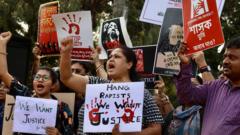A court in Kolkata has found hospital volunteer Sanjay Roy guilty of the rape and murder of a 31-year-old trainee doctor, an incident that has deeply unsettled India and spurred mass protests over women's safety. This violent crime took place in August 2024 at the RG Kar Medical College and Hospital, after the doctor, who was on a demanding 36-hour shift, was attacked while resting in a seminar hall.
Conviction in Kolkata Doctor Rape and Murder Fuels Outrage Across India

Conviction in Kolkata Doctor Rape and Murder Fuels Outrage Across India
A court finds hospital worker guilty of a crime that has ignited national protests and raised alarms over women's safety in healthcare.
Judge Anirban Das indicated that the sentence for Roy, who has consistently claimed his innocence and alleged that he was unjustly accused, would range from life imprisonment to the possibility of the death penalty. The mother of the victim has expressed fears that the integrity of India's justice system would be at stake if Roy does not receive the most severe punishment.
The victim's body was discovered on August 9, with findings from the post-mortem indicating signs of a struggle and strangulation. Following Roy's arrest the day after the attack, the case transitioned from local police investigation to that of the Central Bureau of Investigation (CBI) amid allegations of mishandling due to public outcry.
For several weeks, protests surged across India, with healthcare professionals and students demanding justice and enhanced safety protocols for medical staff, amidst a backdrop of rising violence against them. Notably, the "Reclaim the Night" marches, which drew tens of thousands of women in August, underscored the urgency for change, coinciding with India's Independence Day.
The victim's family later sought a renewed investigation from the Calcutta High Court, voicing concerns that the CBI had not explored all avenues—implying other individuals may have been involved in the crime.
This tragic occurrence has illuminated a broader issue in India regarding the consistent rise in violent attacks against healthcare workers; a 2017 survey revealed that over 75% of doctors reported experiencing violence in their work environment. Additionally, sexual violence against women remains unsettlingly high, with official records noting over 31,000 rape cases in 2022 alone—though many incidents remain unreported due to societal stigmas and mistrust in law enforcement.
The incident is reminiscent of the 2012 gang rape and murder case of a medical student in Delhi that incited global outrage and led to significant changes in India's rape laws. Activists continue to call for a societal shift to support victims rather than blame them, particularly in rural areas.
As the country reels from this conviction, eyes remain on the legal proceedings and the implications for women's safety and the healthcare sector in India.
The victim's body was discovered on August 9, with findings from the post-mortem indicating signs of a struggle and strangulation. Following Roy's arrest the day after the attack, the case transitioned from local police investigation to that of the Central Bureau of Investigation (CBI) amid allegations of mishandling due to public outcry.
For several weeks, protests surged across India, with healthcare professionals and students demanding justice and enhanced safety protocols for medical staff, amidst a backdrop of rising violence against them. Notably, the "Reclaim the Night" marches, which drew tens of thousands of women in August, underscored the urgency for change, coinciding with India's Independence Day.
The victim's family later sought a renewed investigation from the Calcutta High Court, voicing concerns that the CBI had not explored all avenues—implying other individuals may have been involved in the crime.
This tragic occurrence has illuminated a broader issue in India regarding the consistent rise in violent attacks against healthcare workers; a 2017 survey revealed that over 75% of doctors reported experiencing violence in their work environment. Additionally, sexual violence against women remains unsettlingly high, with official records noting over 31,000 rape cases in 2022 alone—though many incidents remain unreported due to societal stigmas and mistrust in law enforcement.
The incident is reminiscent of the 2012 gang rape and murder case of a medical student in Delhi that incited global outrage and led to significant changes in India's rape laws. Activists continue to call for a societal shift to support victims rather than blame them, particularly in rural areas.
As the country reels from this conviction, eyes remain on the legal proceedings and the implications for women's safety and the healthcare sector in India.





















